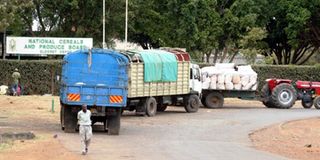NCPB imports more fertiliser

Photo/FILE
Trucks deliver grains to the National Cereals and Produce Board depot in Eldoret.
Additional subsidised fertiliser has been imported to ease the acute shortage of the input among small-scale farmers.
The National Cereals and Produce Board (NCPB) has brought in 400,000 bags of Calcium Ammonium Nitrate (CAN) for top dressing and 600,000 bags of Di-Ammonium Phosphate (DAP) for late planting.
“The imported fertiliser is in addition to the 210,000 bags of CAN the board imported early this year,” NCPB communications manager Evans Wasike said on Tuesday.
This was inadequate, hence the acute shortage experienced when farmers were planting their maize crop.
Sparking protests
The shortage of the subsidised input, which is distributed by the NCPB, sparked protests from growers.
A bag of DAP costs Sh2,800 while CAN costs Sh1,600 in most parts of the North Rift region, which most farmers say they cannot afford.
Mr Wasike also said some management changes had been made at the NCPB. Former Agriculture permanent secretary Wilfred Mwangi has replaced Mr Jimnah Mbaru as board chairman.
Prof Mwangi, who was a member of the team appointed to implement reforms in the economy, took over last week after Mr Mbaru’s term expired.
“The introduction of the warehouse receipt system and trading on the commodity exchange are some of the reforms that have transformed the board,” said Mr Wasike.
Meanwhile, the Agriculture ministry has warned of an acute food crisis in arid and semi-arid parts of Rift Valley.
Most parts of Laikipia, Turkana, Pokot, Baringo, Kajiado and Samburu face food shortages due to erratic weather.
“Although food security improved slightly recently, there is a risk of drifting back to food insecurity this season due to sporadic rainfall,” says a report by the ministry.
The report says parts of Central and Western Rift are on the brink of food insecurity as a result of a combination of drought and floods.
Unlike last year when the long rains came early in most parts of Rift Valley, the region experienced a dry spell during the planting period.
The region did not receive rains between the second and third week of March as predicted by the weatherman.
Floods occasioned by heavy rains in parts of the country have added to the farmers’ misery after hundreds of hectares of crops were either swept away or submerged.




